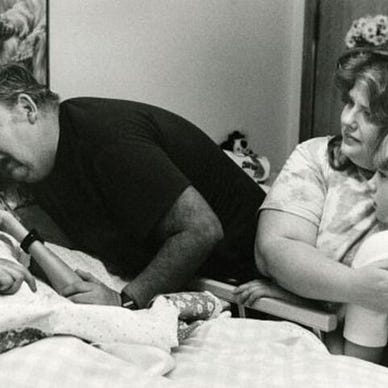HIV POSITIVE | AIDS | INSPIRATION & INFORMATON
Being HIV Positive And Dying From AIDS
The inspiration behind Thirteen Years, a friend’s story
In the early eighties, the world learned of a mysterious disease killing gay men. I took note, but being a young single mom, I had other things demanding my attention and only occasionally paid some attention to the news about AIDS.
In my second year of university, I had several one-night stands, and when I met my first husband in 1985, we frequently had unprotected sex. Condoms were for bad girls, and I didn’t consider myself being one of them.
The name ‘acquired immune deficiency syndrome’ (AIDS) is the name given to the collection of potentially life-threatening illnesses and infections which happen when the HIV virus has severely damaged the immune system.
One person cannot transmit AIDS to another.
Let’s jump to 1990. By then, I was a divorced woman with two children and in my mid-twenties. I was ‘on the market’ again, and still condoms were not part of my vocabulary.
Irresponsible? Yes!
Was I the only one? No.
AIDS happened to gay men, not to people like me, and I didn’t know any gay men.
How wrong I was.
The human immunodeficiency virus (HIV) damages the cells in the immune system and weakens the ability to fighter everyday infections (like a common cold) and disease.
One person can transmit the HIV virus to another.
I worked in a military personnel office in Cape Town from November 1989 until January 1993.
That was still a time barely anyone ever came out of the closet. Oh yes, of course, we had our suspicions, but we never knew for sure.
We were a group of colleagues who were close — friends — and one of them was an attractive man. He was always immaculately dressed, and he was one of whom we suspected was gay. But we never knew for sure, because he never had a boyfriend.
Or a girlfriend, for that matter.
Anecdote: I was unhappy in love, and there were moments I had thought of asking this colleague-friend to marry me, since he was as lonely as I was.
One person spread the HIV virus to another through body fluids, which includes semen, vaginal and anal fluids, blood and breast milk, but it doesn’t include sweat, urine or saliva.
The most common way to transmit the virus to another person is through anal or vaginal sex.
It was only in 1996 that I learned and knew for sure my friend was gay. One of or mutual friends informed me he was gravely ill and in the hospital, and that his hospitalization was AIDS-related.
It was still in the time of writing each other letters (we had a computer and e-mail, but he didn’t). Where he and I had written each other letters before, they weren’t frequent, but at that moment I changed it. He had always been special to me, and I hated that a beautiful person like him had to suffer from such a terrible disease.
We became even closer than before.
He told me his entire history. How, when and from who he got the HIV virus, but also about the way people around him reacted to it. In one of his letters he wrote that someone told him he should write a book about his story.
He never got to do it, so I did it. On 1 August 2009 — ten years after his passing — I self-published a book with his story. In 2021 I started editing it for my blog, and seven weeks later started publishing it here on Medium too, as a series.
That series is called Thirteen Years.

It’s called Thirteen Years, because the HIV virus took thirteen years to destroy my friend’s body and let AIDS kill him.
It’s a story of the early days of HIV, but still relevant today. These stories need to be told.
Why?
Because the HIV epidemic is still not over.
HIV is still part of our lives.
According to UNAIDS 37.7 million people across the world lived with HIV in 2020. Over 1 million Americans are living with HIV today. According to HIV.gov, 13 percent of them don’t know they’re infected and need to be tested. Closer to home, in The Netherlands, an estimate of 24.000 people live with HIV, but about 7% of them don’t even know they are HIV positive.
The only way to know is to test.
When my friend visited us in The Netherlands, he ended up in hospital, severely ill. At the time we didn’t know it, but when back in South Africa they told him: you have AIDS.
His last months were horrible. Pain. Infections. Frequent hospitalization. Loss of hair. Loss of weight. Weakness. He kept a smile on his face, but he suffered.
Please, if you have unprotected sex, get tested frequently. Go to your health officials — a nurse, your doctor, or a health clinic — and ask to be tested!
In loving memory of Pieter Willem (Willie) Vorster (20.10.1961–01.08.1999)
🦋 Subscribe to my stories
